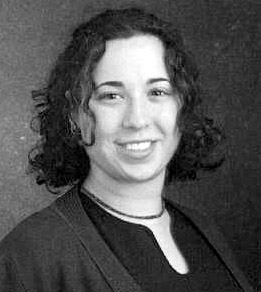
The writing on the wall
Rebecca Laptook delivered this speech Tuesday at the Phi Beta Kappa initiation:
The other day, while avoiding the task of writing this speech, something strange happened to me.
As I indulged in one of my frequent bookstore explorations, I looked up. Now, I do often look up, but, evidently, I don’t always look high enough because I had never noticed the huge words inscribed on the wall above me. I must have seemed really weird standing there staring up for so long because a couple of salespeople asked me if I needed help. Little did they know, I had just discovered the help that I needed.
There on the wall were the words of Marshall Terry, SMU’s past provost. They read, “The essence of SMU’s educational philosophy is that professional studies must rise from the solid foundation of a basic liberal arts education.” For those of you who do not know, this quote also reflects the essence of Phi Beta Kappa’s philosophy. Consequently, I interpreted this experience in the bookstore as a divine message to immediately stop procrastinating and to get to work on my speech (which I did) and, in the future, to always look up and read the writing on the wall.
Now that I find myself only a few days away from graduating from SMU, I am proud to be a member of Phi Beta Kappa and grateful to SMU for encouraging me to sample knowledge from the many different departments in the arts and sciences. As an SMU student and a member of the University Honors Program, I was required to take courses that I probably would have otherwise neglected. I met a lot of professors and fellow students whom I might not have known. I enjoyed the readings, the lectures and the discussions … and I survived them all! I admit that I could have done without some of the papers and tests, but that’s just part of the educational system.
So now that the summa cum laude stamp with honors is being printed on my diploma, I can read and learn simply for the personal pleasure and satisfaction that it brings. I have learned how to appreciate the acquisition of knowledge. I am curious, and I am equipped with the tools and the desire to feed that curiosity. This is what a liberal arts education is all about. This attitude is what each of you should embody as a member of this prestigious honor society.
It is ironically appropriate that I am ending my time at SMU giving this Phi Beta Kappa speech at the invitation of Ms. Diana Grumbles, the Phi Beta Kappa secretary. Grumbles was my Honors Rhetoric course instructor during my first semester at SMU. Since that time, she has become my friend and mentor. We all have come to recognize and appreciate teachers like Grumbles. She is knowledgeable, friendly, enthusiastic, and compassionate. She taught the Honors Rhetoric course in a manner that encouraged me to take risks with my writing and expand my grasp of the literature through critical reflection and by incorporating new ideas from different disciplines. Grumbles set my feet on the path of an excellent liberal arts education, and I intend to keep going past my graduation milestone and down the road of life carrying as many books as I can possibly read until I reach the end of that road.
Speaking of the end … the end is a main theme in Leo Tolstoy’s “The Death of Ivan Ilych,” which was one of the readings in the Honors Rhetoric course that has had a lasting effect on me. When faced with his impending death, the main character in this story asks himself, “What if my whole life has really been wrong?” Having lived his life focusing on his job and ignoring the pitiful state of his personal relationships as well as his own crippled emotional health, Ilych realizes that he did not live as he should have … “that his life has been trivial and disgusting.” Though he has followed a well-worn path, he winds up lonely, fearful, disappointed, and desperate to understand how his life went so wrong.
The pain of coming to the end of his existence feeling that his life has been of no meaning to anyone is more painful to Ilych than his physical illness. His life would soon be over, and he could not have it back to live again. We, on the other hand, have read (or should read) Tolstoy’s tale and many others with the same message. We have also had the opportunity to learn a great deal about the human condition through our studies of psychology, sociology, philosophy, film, literature, theology, etc. etc. etc.
Perhaps you have even spent some time thinking about the witty words of that great baseball player, Yogi Berra, who said, “If you don’t know where you’re going, you’ll end up someplace else.”
Well, we don’t want to wind up in that “someplace else” that Ivan Ilych found himself. So, plot your course carefully and try to make good choices. As my well-rounded liberal arts education has taught me, we should try to live in such a manner that at the end of the day we will be able to look back and know that we have loved and been loved, we have mattered to others, we have made a difference, and that we have learned a great deal as we journeyed down life’s path.










